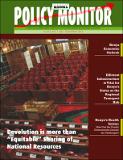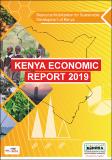| dc.date.accessioned | 2021-02-26T13:11:00Z | |
| dc.date.available | 2021-02-26T13:11:00Z | |
| dc.date.issued | 2013 | |
| dc.identifier.uri | http://repository.kippra.or.ke/handle/123456789/2720 | |
| dc.description.abstract | There is a skewed
perception in Kenya
today that devolution
is just about “equitable”
sharing of national resources.
This perception of devolution
has its roots. The emotions
and passions that energized
Kenyans to work for and pass
the 2010 Kenya constitution
was largely premised on the
perception that there are
widespread regional disparities
(in terms of income earnings)
in Kenya. Since independence,
political regimes have tended
to use public resources and
national revenues to reward
cronies, and disproportionally
allocated the same along
ethnic interest.
However, the extent to
which allocation of national
revenue has contributed to
variation in income levels
among different regions
in Kenya is debatable. We
note that regional disparity
may result as a natural
consequence of development
process where various regions
in Kenya, characterized by
different agro-ecological
zones with unique resource
endowments, attract different
sets of economic activities
that the market responds to
differently... | en |
| dc.language.iso | en | en |
| dc.publisher | The Kenya Institute for Public Policy Research and Analysis | en |
| dc.relation.ispartofseries | Policy Monitor Issue 6 No.1 of July-December 2013; | |
| dc.subject | Devolution | en |
| dc.subject | National Resources | en |
| dc.subject | Regional disparities | en |
| dc.subject | Public resources | en |
| dc.title | Policy Monitor, Issue 6 No. 1, July-December 2013 on Devolution is more than "Equitable" Sharing of National Resources | en |
| dc.type | KIPPRA Publications | en |
| ppr.contributor.author | Kenya Institute for Public Policy Research and Analysis (KIPPRA) | en |



